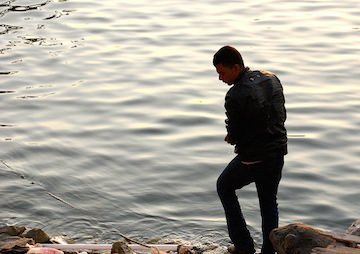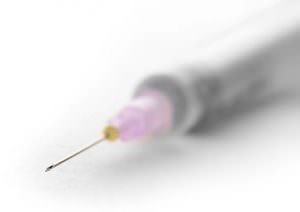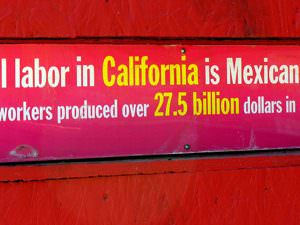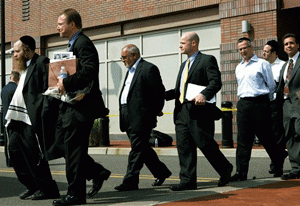A Water Crisis Is Menacing Egypt
A fixed water supply for a rising population means Egypt has less water per person each year, and critics say the government has done almost nothing to resolve the crisis or even help ease the suffering of those most affected. A man stands on the banks of the Nile. (Green Prophet / CC BY 2.0)
A man stands on the banks of the Nile. (Green Prophet / CC BY 2.0)
A fixed water supply for a rising population means Egypt has less water per person each year, and critics say the government has done almost nothing to resolve the crisis or even help ease the suffering of those most affected.
The Guardian reports:
The country’s annual water supply dropped to an average of 660 cubic metres a person in 2013, down from over 2,500 cubic metres in 1947, according to official figures. Egypt is already below the United Nations’ water poverty threshold, and by 2025 the UN predicts it will be approaching a state of “absolute water crisis”. …
In June, the Delta city of Bilqas, with a population of 50,000, was suffering from a severe drought. “We can’t find water to drink, wash, clean or anything. We woke up to find we have moved to the desert and our taps are dry,” said Hossam Megahed, a city resident.
Why are the taps going dry now?
… the problem has been building since 2011. Amid the security vacuum that emerged following the 2011 revolution, thousands of residents on the peripheries of Cairo and other cities began illegally constructing buildings and linking them up to the official supply pipes. Tens of thousands of new pipelines have tapped into water supplies that barely suffice for the citizens already there.
What water is available is often severely polluted and hazardous to health.
In areas such as Ezbit al-Taweel, water bought from trucks is often heavily contaminated. Farmers looking to make a quick profit often transport liquid in tanks normally used to carry gas. These trucks are filled from the most convenient source, which can often be a nearby wastewater canal. …
Wastewater canals are awash with agricultural runoff filled with dissolved fertilisers and pesticides, and make a rich habitat for pathogens such as bilharzia. Heavy metals such as mercury, arsenic, carcinogenic cadmium and lead have also been detected in high concentrations. Kafr al-Sheikh, which lies at the northern end of the Nile, once provided a significant proportion of Egypt’s total fish production. Today, polluted waters have wreaked havoc on stocks. “Fishermen have to find new jobs. Even the fish die,” said Razik.
Poor sanitation, the Egyptian Centre for Economic and Social Rights reports, means that 95.5 percent of the population drinks improperly treated water.
Ibrahim Salman, head of the Mid-Delta Drainage Canals Authority, offered three possible solutions:
The first is pumping for underground water, which is expensive, takes time and draws on finite sources of groundwater. The second is adopting water-efficient agricultural technologies like drip irrigation, instead of the flooding techniques still used by most Egyptian farmers. This, Salman said, is a long-term solution, not one that can be implemented overnight. The third is finding ways to recycle water from drainage canals. Unfortunately, at present these canals carry highly toxic industrial and agricultural waste mixed with the low toxicity freshwater.
Read more here.
— Posted by Alexander Reed Kelly.
Your support matters…Independent journalism is under threat and overshadowed by heavily funded mainstream media.
You can help level the playing field. Become a member.
Your tax-deductible contribution keeps us digging beneath the headlines to give you thought-provoking, investigative reporting and analysis that unearths what's really happening- without compromise.
Give today to support our courageous, independent journalists.





You need to be a supporter to comment.
There are currently no responses to this article.
Be the first to respond.